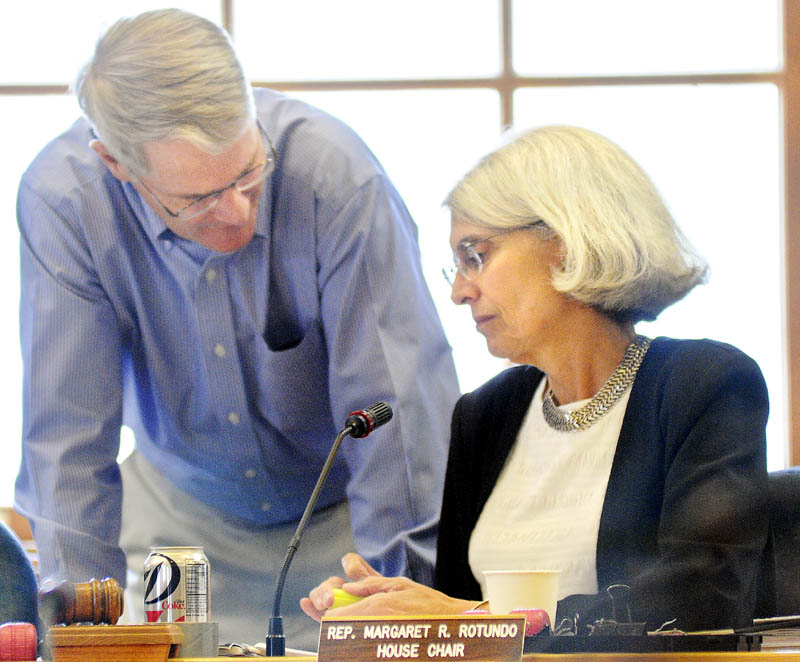AUGUSTA — The political standoff over whether the state should borrow for transportation, education and research and development projects continued Tuesday as the Legislature’s budget-writing committee attempted to winnow 30 different bond proposals.
Among them is Gov. Paul LePage’s $100 million transportation bond, which includes funding for roads, bridges, ports and rail.
The governor and Republican lawmakers on Tuesday continued to press the Democratic-controlled Legislature to approve the proposal this month so it can go to voters in November.
Democrats continued to insist that all bonds can wait until June to go to voters so lawmakers can negotiate a comprehensive borrowing plan that includes transportation and infrastructure projects in the University of Maine and community college systems, as well as land preservation.
The competing proposals could help pay for a range of projects, from repairing Route 302 in Bridgton and Main Street in Freeport to improving the intersection at Interstate 295 and Forest Avenue in Portland.
The Maine Department of Transportation says the money could also help extend rail service on the Portland waterfront and secure investment there by an Icelandic shipping company.
The political arguments in Augusta, however, have less to do with the merits of such projects than with the timing of a voter referendum and whether a borrowing package should be limited to transportation.
Both parties will have to compromise, as a two-thirds majority is required to bring a bond proposal to voters. The Appropriations Committee must first decide whether to present a borrowing package to the full Legislature.
The battle is rooted in politics, a point underscored Tuesday when the LePage administration rejected requests for department heads to appear before the committee. This left Democrats no chance to publicly question administration officials on the transportation bond and other issues.
Republicans argued Tuesday that the transportation bond can’t wait until June because the delay could interrupt the Maine transportation department’s work plan for 2014 and 2015. The LePage adminstration also said Tuesday the bond should move forward in case the funds are needed to take over rail lines that could go out of business because of last month’s deadly train crash in Quebec.
Democrats hope to use their majority to ensure that non-transportation projects are approved. Money from other, already approved, bonds has yet to be issued, they said.
“The only thing holding this up is politics,” said Republican House leader Rep. Kenneth Fredette, R-Newport, adding that Democrats could approve the governor’s proposal in “15 minutes.”
Fredette said Republicans see no need to return in September to vote on a slate of bond proposals if Democrats don’t immediately approve the governor’s bond plan and allow LePage to call a special legislative session by the end of the week.
Democratic leaders were just as entrenched, and invited guests to testify on the state’s borrowing capacity and how infrastructure funding would benefit stakeholders.
Ryan Low, representing the University of Maine, furnished a graphic showing the system’s aging facilities, 36 percent of which are over 50 years old.
“We’re at a point where the projects pick us instead of the other way around,” Low said.
The Maine Community College System said its $15 million request would allow the enrollment of 2,400 additional students.
Charles Colgan, a former state economist under Democratic Gov. John Baldacci and now an associate director with the Maine Center for Business and Economic Research, told lawmakers that they should borrow soon enough to allow the state to take advantage of low interest rates that could save taxpayers an estimated $20 million on a $100 million bond.
Colgan said these savings could likely be achieved if bonds are approved by June, a point Democrats quickly echoed.
LePage, in a video address sent Monday, said the transportation bond was critical lest transportation projects go unfunded next year.
The governor’s bond provides $81 million for improvement to highways and bridges and “job stability to those in the construction industry, where more than 8,000 jobs have been lost since 2006,” he said.
LePage also highlighted $19 million for multimodal projects, including extending railroad tracks to the International Marine Terminal on the Portland waterfront, a crucial piece in a deal with Eimskip, the Icelandic shipping company that moved its North American operations to Portland in March.
Eimskip said it moved to Portland after state officials assured the company that Pan Am Railways tracks would be extended about 1,500 feet so freight trains could reach the International Marine Terminal, where Eimskip’s ships dock.
But Democrats on Tuesday cited an analysis by the Legislature’s fiscal office that showed the Transportation Department already has $57 million in voter-approved bonds that the administration still hasn’t issued.
An estimated $41 million of that total gives the department some discretion over which projects to fund.
“When the governor is saying there’s an emergency, there’s $41 million available that he has not issued,” said Rep. Peggy Rotundo, D-Lewiston.
Ted Talbot, a spokesman for the MDOT, took issue with the flexibility of the $41 million, saying borrowing doesn’t allow the department to respond to imminent development projects.
“If we wait, the distance between November and June is seven months,” Talbot said. “Businesses don’t operate that way. They need to be nimble and ready to move. This bond allows us to be nimble and ready to move.”
Steve Mistler can be contacted at 620-7016 or at:
smistler@mainetoday.com
Send questions/comments to the editors.



Comments are no longer available on this story